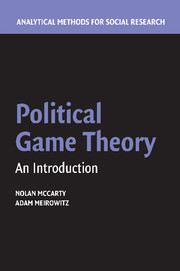Book contents
- Frontmatter
- Contents
- Acknowledgments
- 1 Introduction
- 2 The Theory of Choice
- 3 Choice Under Uncertainty
- 4 Social Choice Theory
- 5 Games in the Normal Form
- 6 Bayesian Games in the Normal Form
- 7 Extensive Form Games
- 8 Dynamic Games of Incomplete Information
- 9 Repeated Games
- 10 Bargaining Theory
- 11 Mechanism Design and Agency Theory
- 12 Mathematical Appendix
- Bibliography
- Index
11 - Mechanism Design and Agency Theory
Published online by Cambridge University Press: 05 June 2012
- Frontmatter
- Contents
- Acknowledgments
- 1 Introduction
- 2 The Theory of Choice
- 3 Choice Under Uncertainty
- 4 Social Choice Theory
- 5 Games in the Normal Form
- 6 Bayesian Games in the Normal Form
- 7 Extensive Form Games
- 8 Dynamic Games of Incomplete Information
- 9 Repeated Games
- 10 Bargaining Theory
- 11 Mechanism Design and Agency Theory
- 12 Mathematical Appendix
- Bibliography
- Index
Summary
So far we have discussed techniques that analyze how strategic agents behave in specific games. In certain social settings where the rules are fairly clear, this approach is a powerful source of intuition and empirical predictions. An alternative approach asks a slightly different question: Given a desired outcome, what games among strategic agents produce it? Do such games even exist?
The field of game theory asking such questions is mechanism design. In this framework, a designer or principal selects a Bayesian game, or mechanism, for agents to play. Examples of mechanism design include the design of tax codes that induce agents to reveal their willingness to fund public projects, the design of auctions that maximize revenue, and the choice of reelection functions by voters that create incentives for government officials to behave well in office.
Typically, the choice of mechanisms is a maximization problem: the designer chooses a game to maximize her utility subject to the constraint that the agents play the game rationally. If the designer's preferences correspond to some notion of social preferences, mechanism design is a normative exercise. A classic example of the normative approach is the selection of rules that determine the provision of public goods to maximize the sum of individual utilities. Given its normative interpretation, mechanism design is closely related to social choice theory.
- Type
- Chapter
- Information
- Political Game TheoryAn Introduction, pp. 320 - 368Publisher: Cambridge University PressPrint publication year: 2007



